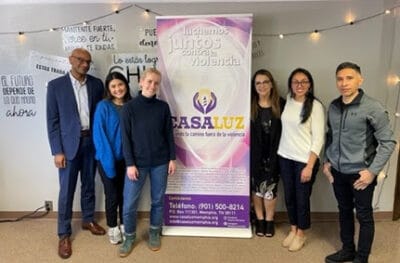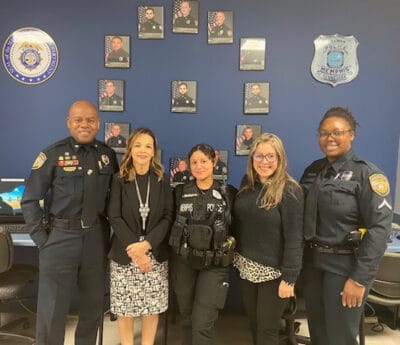The creation of the First Neighborhood Watch Group in Spanish!
A few months ago, I was a little hesitant when Col. Willie Mathena from the Memphis Police Department (MPD) in charge of the Tillman Station Precinct (an area highly populated by Hispanics), approached me at an event and asked for a meeting to discuss better ways to reach out to the Hispanic Community. I wasn’t sure if he was sincerely concerned or if he just wanted to check a box and just have a conversation regarding the lack of trust between members of the Hispanic community and the MPD. Regardless of my tense experience dealing with local law enforcement agencies, I’m always open to talking and collaborating with them, unless in some cases where the line of respect has been crossed without acknowledging any wrongdoing. I put my doubts aside and we met in his office. To my surprise, he and his staff were welcoming and patiently listening when the frustration built up for years due to some police officers using their personal biases and discriminatory practices against vulnerable Hispanic/Immigrant victims of violent crime, including violations of Civil Rights (Title VI).
Unfortunately, it is common when police departments only care about checking a box and reporting that they host an event or a community meeting. Still, there are no intentional efforts behind those activities. The lack of effort can be seen when they don’t provide printed materials in Spanish at those gatherings. Another example is when law enforcement agencies announce the creation and implementation of programs to address the needs of the Hispanic community, but the announcement is in English, distributed through the American media (in English) including videos in English too, and no important/informative materials are translated into Spanish either. It just checks a box with words, but no actions behind it. A program to address the needs of a specific group as the Hispanic community should never be announced until they are ready and prepared to publish announcements in Spanish through Spanish media outlets, distributing important information and resources in Spanish, and having in place a Language Access Plan and Language Access and Cultural Sensitivity Trainings.
Col. Mathena was not offended when I told him that the plan he had to reach out to the Hispanic community was backward, because to have higher engagement from community members it has to start by creating a welcoming and unbiased environment not just for Hispanics but for all immigrants before any outreach efforts can be effective. Together we worked on a plan to develop a more inclusive outreach addressing immigrants from all Latin American countries. He also was very interested in knowing more about the Language Access and Cultural Sensitivity training we provide the MPD recruits. Before that meeting, I spoke with several community members living in that area to hear directly from them, and unfortunately, my suspicions were confirmed about the negative encounters they had when interacting with police officers from that precinct. We are aware that community members need to understand, and it is part of CasaLuz’s ongoing outreach and education that if someone doesn’t report police misconduct it will never be addressed, and if that officer’s behavior is not disciplined it is more likely that the behavior will continue. At the same time, police officers, especially those in higher ranking, need to understand that if an immigrant victim of crime is also a victim of police abuse or mistreatment it will be very difficult to come forward and report the abuse when it was already difficult in the first place to have to courage to contact police at a time of crisis. It’s hard to estimate the number of crimes against immigrants that are not being reported, but Hispanic/immigrants in Memphis, TN have been a target of violent crimes for years due to several factors such as fear and mistrust of police, fear of deportation, language barriers especially if police use victims’ children as interpreters, and the list goes on and on. Victims are not receiving the services they are entitled to, and criminals are on the loose. Criminals know about those barriers to reporting and in many of the cases we have assisted, they even threaten victims of harm to their loved ones if they dare to contact police, making clear to them that they know, for example, the school their children attend.
Col. Mathena was in disbelief when I told him about the difficulties Hispanics have been facing just trying to participate in the neighborhood watch meetings. He not only addressed the issue with words but with actions. He created the First Neighborhood Watch in Spanish (see below the photo of their first meeting). A long dream for many to feel included, to have access to the same services and resources members of other communities have, and to be able to communicate in their native language with a culturally sensitive approach has become a reality thanks to the leadership of Col. Mathena. He understands that building a bridge of trust needs several construction materials, including respect and intentional unbiased approaches.
Overall, rebuilding trust between law enforcement and the Hispanic community requires both understanding and action. Acknowledging the historical and cultural factors that have led to mistrust is the first step. However, without meaningful changes including but not limited to clarifying to the community that they aren’t immigration agents (ICE), creating a Language Access Plan, meaningful engagement with the community, and investing in language access, Civil Rights (Title VI), cultural sensitivity and anti-racial profiling trainings addressed to all officers especially those who supervise —this trust will remain elusive.
By prioritizing these solutions, police departments can begin to rebuild relationships with Hispanic communities. The goal is not just safer neighborhoods, but a mutual understanding where both law enforcement and residents can work together for the common good. Only then can the cycle of mistrust be broken, and a safer, more inclusive society be realized.
Kudos to Col. Mathena for being part of the solution with actions and not just with words! We appreciate you, your leadership, and your efforts to serve all members of all communities with dignity and respect. I hope your enthusiasm and commitment can spread to other leaders in our city.


